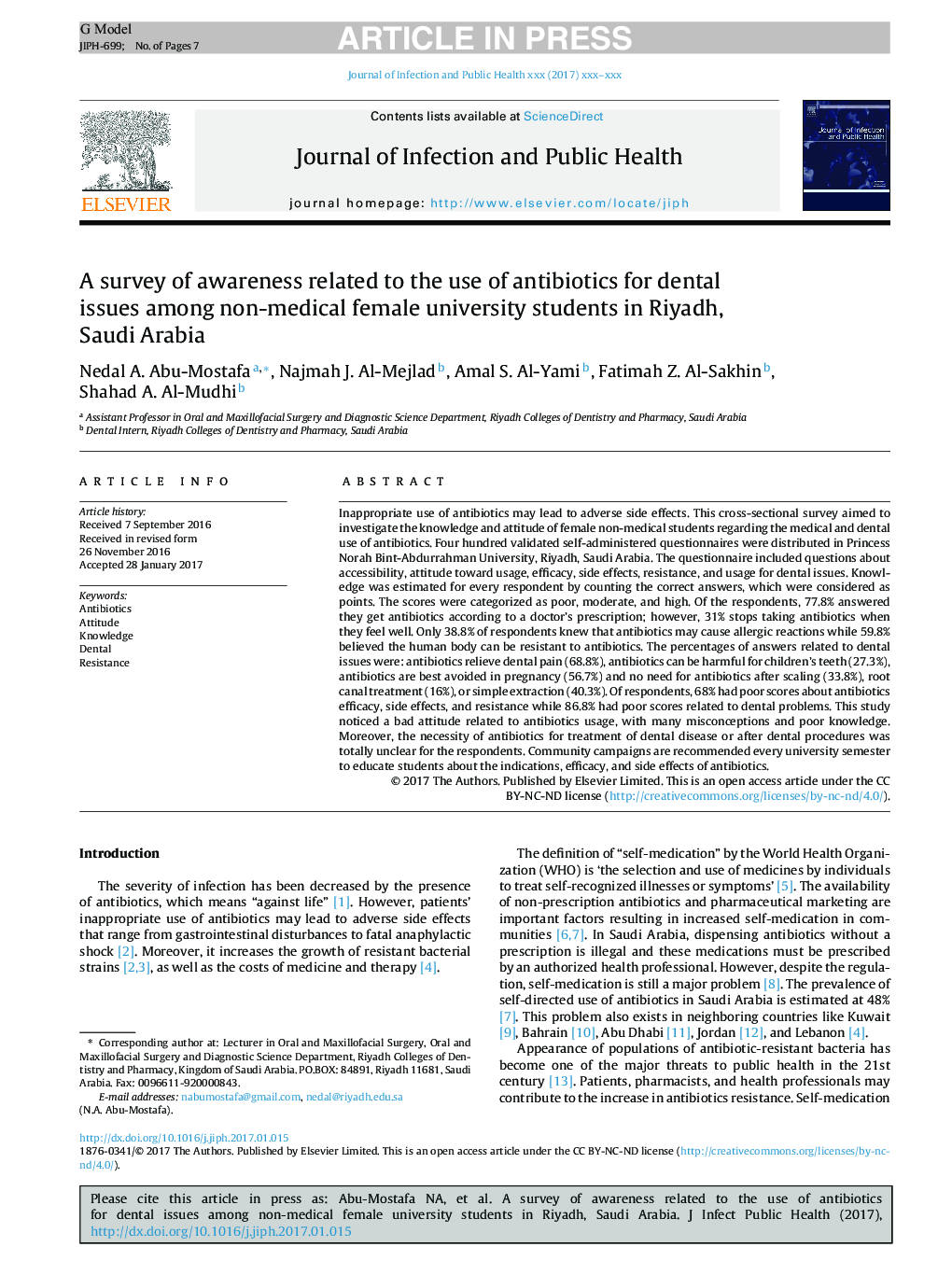| کد مقاله | کد نشریه | سال انتشار | مقاله انگلیسی | نسخه تمام متن |
|---|---|---|---|---|
| 8746935 | 1593370 | 2017 | 7 صفحه PDF | دانلود رایگان |
عنوان انگلیسی مقاله ISI
A survey of awareness related to the use of antibiotics for dental issues among non-medical female university students in Riyadh, Saudi Arabia
ترجمه فارسی عنوان
بررسی آگاهی مربوط به استفاده از آنتی بیوتیک ها برای مسائل دندان پزشکی در دانشجویان غیرمتخصص پزشکی زنان ریاض، عربستان سعودی
دانلود مقاله + سفارش ترجمه
دانلود مقاله ISI انگلیسی
رایگان برای ایرانیان
کلمات کلیدی
آنتی بیوتیک ها، نگرش، دانش، دندانی، مقاومت،
ترجمه چکیده
استفاده نامناسب از آنتی بیوتیک ها ممکن است به عوارض جانبی منجر شود. این بررسی مقطعی با هدف بررسی دانش و نگرش دانشجویان غیر پزشکی در رابطه با استفاده از آنتی بیوتیک های پزشکی و دندان پزشکی بود. چهارصد پرسشنامه معتبر خودآموزی در دانشگاه پرنسس نورا بنت-عبدالرحمن، ریاض، عربستان سعودی توزیع شد. پرسشنامه شامل سوالاتی در مورد دسترسی، نگرش نسبت به استفاده، اثربخشی، عوارض جانبی، مقاومت و استفاده از مسائل دندانپزشکی بود. دانش برای هر پاسخ دهی توسط شمارش پاسخ صحیح، که به عنوان امتیاز مورد توجه قرار می گرفت، تخمین زده شد. نمرات به عنوان فقیر، متوسط و بالا طبقه بندی شدند. از پاسخ دهندگان، 77.8 درصد پاسخ دادند که طبق نسخه پزشک، آنتی بیوتیک ها دریافت می کنند؛ با این حال، 31 درصد آنتی بیوتیک ها را در هنگام احساس خوب بودن متوقف می کنند. فقط 38.8 درصد از پاسخ دهندگان می دانستند که آنتی بیوتیک ها ممکن است باعث واکنش های آلرژیک شوند، در حالی که 8/59 درصد معتقدند بدن انسان می تواند به آنتی بیوتیک ها مقاوم باشد. درصد پاسخ های مربوط به مسائل مربوط به دندانپزشکی: آنتی بیوتیک ها از درد دندان ها (8/68 درصد)، آنتی بیوتیک ها را برای دندان های کودک (3/27 درصد) مضر می دانند، بهترین آنتی بیوتیک ها در دوران بارداری (7/6 درصد) و قبل از مقیاس ٪)، درمان کانال ریشه (16٪)، یا استخراج ساده (3/40٪). از پاسخ دهندگان 68٪ نمرات ضعیف در مورد اثربخشی آنتی بیوتیک ها، عوارض جانبی و مقاومت داشت، در حالی که 86.8٪ نمرات ضعیف مربوط به مشکلات دندانی داشتند. این مطالعه متوجه نگرش بد در مورد استفاده از آنتی بیوتیک ها، با بسیاری از سوء تفاهمات و دانش ضعیف است. علاوه بر این، ضرورت استفاده از آنتی بیوتیک ها برای درمان بیماری های دندانی و یا پس از درمان دندان ها برای پاسخ دهندگان کاملا مشخص نیست. کمپین های جامعه در هر ترم تحصیلی توصیه می شود تا دانش آموزان را در رابطه با نشانه ها، اثربخشی و عوارض جانبی آنتی بیوتیک ها آموزش دهند.
موضوعات مرتبط
علوم پزشکی و سلامت
پزشکی و دندانپزشکی
بیماری های عفونی
چکیده انگلیسی
Inappropriate use of antibiotics may lead to adverse side effects. This cross-sectional survey aimed to investigate the knowledge and attitude of female non-medical students regarding the medical and dental use of antibiotics. Four hundred validated self-administered questionnaires were distributed in Princess Norah Bint-Abdurrahman University, Riyadh, Saudi Arabia. The questionnaire included questions about accessibility, attitude toward usage, efficacy, side effects, resistance, and usage for dental issues. Knowledge was estimated for every respondent by counting the correct answers, which were considered as points. The scores were categorized as poor, moderate, and high. Of the respondents, 77.8% answered they get antibiotics according to a doctor's prescription; however, 31% stops taking antibiotics when they feel well. Only 38.8% of respondents knew that antibiotics may cause allergic reactions while 59.8% believed the human body can be resistant to antibiotics. The percentages of answers related to dental issues were: antibiotics relieve dental pain (68.8%), antibiotics can be harmful for children's teeth (27.3%), antibiotics are best avoided in pregnancy (56.7%) and no need for antibiotics after scaling (33.8%), root canal treatment (16%), or simple extraction (40.3%). Of respondents, 68% had poor scores about antibiotics efficacy, side effects, and resistance while 86.8% had poor scores related to dental problems. This study noticed a bad attitude related to antibiotics usage, with many misconceptions and poor knowledge. Moreover, the necessity of antibiotics for treatment of dental disease or after dental procedures was totally unclear for the respondents. Community campaigns are recommended every university semester to educate students about the indications, efficacy, and side effects of antibiotics.
ناشر
Database: Elsevier - ScienceDirect (ساینس دایرکت)
Journal: Journal of Infection and Public Health - Volume 10, Issue 6, NovemberâDecember 2017, Pages 842-848
Journal: Journal of Infection and Public Health - Volume 10, Issue 6, NovemberâDecember 2017, Pages 842-848
نویسندگان
Nedal A. Abu-Mostafa, Najmah J. Al-Mejlad, Amal S. Al-Yami, Fatimah Z. Al-Sakhin, Shahad A. Al-Mudhi,
